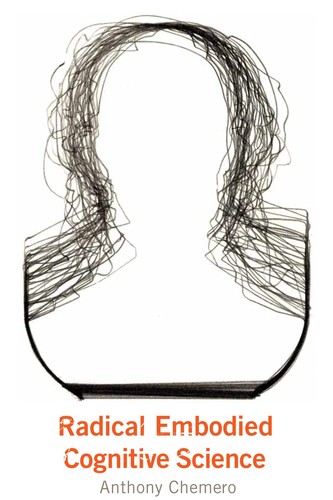Vincent Tijms reviewed Radical embodied cognitive science by Anthony Chemero (A Bradford Book)
Review of 'Radical embodied cognitive science' on 'Goodreads'
4 stars
Some quick comments on this excellent book:
The case for antirepresentationalism did not get to me. Then again, I'd say that a retinal activation is already a representation (even according to the definition Chemero offers). The fact that cognitive maps have been succesfully decoded from hippocampal place cell information shows just to what extent such representations are maintained in the brain. I am not sure whether direct perception can explain this.
The dynamic system models are put forward as being not merely descriptive of cognitive systems, but revealing as to their nature. The fact that the same equations apply to widely different systems should already give pause. I don't think they argue against representations in any way - it's just the the representations are not explicitly there in the model. Not looking at steady state dynamical coupling, but looking at the spread of oscillatory coupling (which requires an admittedly high …
Some quick comments on this excellent book:
The case for antirepresentationalism did not get to me. Then again, I'd say that a retinal activation is already a representation (even according to the definition Chemero offers). The fact that cognitive maps have been succesfully decoded from hippocampal place cell information shows just to what extent such representations are maintained in the brain. I am not sure whether direct perception can explain this.
The dynamic system models are put forward as being not merely descriptive of cognitive systems, but revealing as to their nature. The fact that the same equations apply to widely different systems should already give pause. I don't think they argue against representations in any way - it's just the the representations are not explicitly there in the model. Not looking at steady state dynamical coupling, but looking at the spread of oscillatory coupling (which requires an admittedly high temporal resolution) would reveal time constants on the order of neural processing, I'm sure. This process of coupling uses representations - at least in the sense of the word that I would use as a neuroscientist. We know this not through the dynamic systems model that hides the variables, but through mechanistic work on brain processing. Compare this to the transfer of oscillations through direct physical coupling, where it's molecular collisions carrying phase information: salt.uaa.alaska.edu/dept/metro.html
Direct perception of temporal derivatives like tau (or of tau, even) seems impossible without some form of memory, as physical events exist at specific points in time. Using an oscillatory model with momentum could solve some of this (and I would not object to anyone claiming such an echo is not a representation, although one could argue in favor of such a view), but only up to a certain point. Memory is a huge problem for direct perception, I would say. Chemero sidesteps this point by looking away from representations that are causally uncoupled, arguing that he best make his point for the more general case of representationalism. However, there's nothing general about focusing on the existence of representations that are still coupled to the mind through sensory input
Affordances truly offer a better way of doing behavioral science. I think even the radical reductionists from this book would admit they need to know their behavioral science - looking at this in terms of affordances could prove very fruitful. Not because they are perceived directly (they could just as well be computationally derived) but because they allow for a sophisticated behavioral setup and, while behavioral scientists can do without the brain, cognitive neuroscientists can't do without behavior.
I think there are some more points, but I will leave it at that. Hopefully, I will be able to write a clearer review soon.
RECS is a fascinating read for anyone who takes cognitive science seriously. Even if you do not agree with the main points made in the book, it will still open your mind to considering the field from a different perspective, which is only healthy when setting up and interpreting experiments. The book makes clear how the dynamic systems model can offer a way of approaching cognition from a different perspective, opens the way for extraneural cognition to be taken seriously (which I think is really necessary at this point) and forces the reader to think deep and hard about representations.
Do leave a comment if you'd like to discuss this title!

